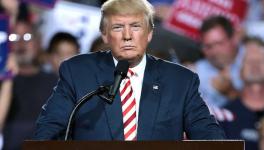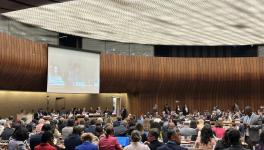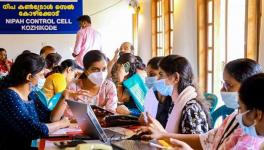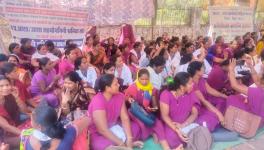Who Benefits from a Compromised World Health Organisation?
The World Health Organisation is set to elect a new Director General at the World Health Assembly in May 2017, marking the completion of two four-year terms of the current Director General, Margaret Chan. Three candidates were shortlisted at the recently concluded Executive Board meeting of the WHO in Geneva -- Sania Nishtar from Pakistan, David Nabarro from the UK and Tedros Adhanom Ghebreyesus from Ethiopia.
While, on the surface, it appears to be business as usual in the corridors of the premier organisation for health at the global level tasked with setting global norms and standards and with co-ordinating affairs related to international health, nothing could be further from the truth. The WHO is beset with fundamental challenges that threaten the very foundations and founding principles of the organisation. WHO’s capacity to intervene on issues related to international health and accomplish its basic norm setting function has been seriously eroded over the years. Gone are the days when countries looked up to the WHO for guidance and support while formulating domestic policies. WHO’s legitimacy in affairs related to international health stands compromised given its repeated failure to seek compliance with resolutions adopted at the annual World Health Assembly. Underpinning these deficiencies is the WHO’s funding crisis which does not allow the organisation to carry out its normative activities. Unfortunately, going by their public pronouncements, none of the short listed candidates seem qualified or able to provide meaningful leadership to the ailing organisation.
Undermining the UN system
Several interrelated actors are responsible for the current state of the WHO. Since the early 1980s, the global architecture of governance, trade and economics has come to be informed by neoliberal globalisation, and consequently national decision making and national policies are often subject to global influences. This is true in the health sector as well and the advent of neoliberal globalisation marks a shift in institutions and structures that govern health at a global level.
Neoliberal globalization has unleashed major changes that have led to the erosion of the WHO’s capacity, legitimacy and resources. WHO’s voice on matters of international health has been muted by the emergence of the World Bank as a major player in the arena of health governance in the 1980s. The growing importance of global trade in international relations and social and economic development has led to people’s health, across the world, being impacted by the World Trade Organisation (WTO) and regional and bilateral trade agreements. Private foundations (such as the Bill and Melinda Gates Foundation), through involvement in public private partnerships and other avenues, often have a more influential role in moulding polices on health in countries and at the international level.
These developments that have weakened the role of the WHO have the support of powerful imperialist countries. These countries, led by the United States and supported by other OECD countries, have today a cynical disregard for the ability of the nation state driven UN agencies such as the WHO to shape global governance. They see the member state‐driven process in the WHO (where each country has one vote) as a hindrance to their attempts to shape global health governance, and prefer to rely on institutions such as the World Bank and the WTO, where they can exercise their clout with greater ease. Further imperialist countries have been at the forefront of promoting what many call the ‘multistake-holder’ model of global governance. In such a model the central role of nation states in the global governance for health is sought to be diluted by seeking an equal (and often dominant role) for private foundations (generally based in the United States such as the Bill and Melinda Gates Foundation and the Rockefeller Foundation), private consultancy firms (such as McKinsey, PricewaterhouseCoopers, etc.) and multinational corporations.
Gates Foundation epitomizes private influence on Global Health
The ascent of the Bill and Melinda Gates Foundation as a global player in health has been particularly spectacular. In the past decade the Gates family (Bill Gates and his wife, Melinda Gates) have been thrice invited to address the World Health Assembly as a keynote speaker. The Foundation is also the biggest funder of the WHO and, as we discuss later, has a critical role in deciding the policies and areas of work of the WHO. Few question the fact that the foundation’s role in global health needs to be viewed in the context of its major investments in health damaging industries – in the beverages industry such as Pepsi and Coke and in hazardous chemical industries.
Its rise is linked with the conceptualisation of a new family of global initiatives since the 1990s, termed as Global Public Private Initiatives (GPPIs). In the past two decades several hundred such initiatives have been launched, with over 100 in the health sector alone. GPPIs have now replaced UN agencies such as the WHO in many areas of global governance and have been encouraged by imperialist countries. The argument used for the propagation of such arrangements that force countries into partnership with private entities (foundations, consultancies, corporations) is that multilateral co‐operation in the present globalised world can no longer adhere to the older principle of multilateralism that primarily involved nation states. In the health sector so called ‘philanthropic’ foundations such as the Gates Foundation are the lynchpins in many of these partnerships that shape health at the global level. For example, two major global initiatives on health – the Global Vaccine Alliance (GAVI) and the Global Fund for AIDS, TB, and Malaria (known as the Global Fund) – were deliberately kept out of the purview of the WHO so that private actors could be accommodated in the decision making structures of these multilateral initiatives.
These global partnerships need to be viewed in the context of an attempt to address the obvious failure of the market to deliver services and goods where most required, i.e. to the income and resource poor, while at the same time staying within the boundaries of neoliberal economic policies. They address what neoliberal economists describe as "market failures", but at the same time do not question the fundamental faith in the ability of the market to regulate the global flow of goods and services.
In 2010-11 the developed countries forced the WHO to undertake a series of ‘reforms’. At the heart of this enterprise was the attempt to further weaken WHO’s norm setting functions. One of the outcomes of these reforms was the adoption by the World Health Assembly in 2016 of a Framework for Engagement with Non-State Actors (FENSA). The adoption of FENSA marks the formal approval of the ‘multistake-holder’ approach to governance of the WHO. It allows for-profit organisations to be allowed in decision making structures of the organisation. This is particularly problematic as the WHO’s role of setting standards and norms on health will inevitably bring the organisation into conflict with private organisations, who now have a role in its governance structures.
WHO’s funding crisis – deliberate and motivated
It is striking that the five year long process directed at reforming the WHO did not address the organisation’s key deficiencies related to its funding crisis. Currently only 20% of WHO’s finances come from what are called ‘assessed contributions’ which are mandated contributions from countries which are members of the WHO. The rest of its funds come from donors, which include countries as well as private donors such as the Gates Foundation. These donor provided funds are tied to specific programs of the WHO that donors are interested in. Many imperialist countries, including prominently the United States, prefer to fund specific programs rather than to increase their assessed contributions. As a result most of the programs adopted by the World Health Assembly are seldom funded adequately as donors are not interested in supporting them. Consequently the World Health Assembly has been converted into a charade that goes through the motions of deliberating on programs that the WHO should prioritize while donors decide behind closed doors which programs would actually be funded. The impact is easy to see – WHO’s programs that harm interests of imperialist countries and corporations, such as on access to essential medicines, on addressing the social determinants of health, etc. are consistently starved of funding. The United States and its allies regularly block discussions on the health impact of Patent rights and trade agreements.
It may be recalled that the genesis of the WHO’s financial crisis which now threatens the organisation’s independent role, has its roots in the three decade old US led freeze on contributions to UN organisations. As in the health sector, in all other sectors as well, the United States and its allies have been at the forefront of a calculated strategy that seeks to weaken and destroy the country-driven UN system. As a result, in three decades, the WHO has transited form a situation where it was largely funded by mandated untied contributions from countries to a situation where it is captive to the interests of donors. What makes this situation particularly unacceptable is the fact that WHO’s overall budget (this includes the entire budget for its headquarters in Geneva, its five regional offices and its offices in over 180 countries), at approx. US$ 2.2 billion per year, is very modest. WHO’s 2.2 billion budget is around 30% of the annual budget of US Centre for Disease Control; 30% of India’s budget for the National Health Mission; 4% of Pfizer’s turnover; and 3% of Unilever’s turnover in 2015; and around 10% of annual advertising budget of pharmaceutical companies in the US. Even for Middle Income countries such as India, Brazil and China enhancing contribution to the WHO would be a very small burden. Clearly the donor chokehold on the WHO is being sustained because of political reasons and it is unfortunate that developing countries such as India refuse to grasp the nettle and unilaterally increase their contribution to the WHO, so as to firmly prise it from the grasp of imperialist countries.
Countries such as India need understand the strategic importance of a member country driven international organisation on health, that is able to function without being under the influence of motivated interests that seek to profit from ill health. Indian negotiators and diplomats in the WHO are respected for their depth of knowledge on critical issues. Yet, India in recent year has shown a growing readiness to play footsie with the United States and its allies, rather than provide leadership to developing countries.
Disclaimer: The views expressed here are the author's personal views, and do not necessarily represent the views of Newsclick.
Get the latest reports & analysis with people's perspective on Protests, movements & deep analytical videos, discussions of the current affairs in your Telegram app. Subscribe to NewsClick's Telegram channel & get Real-Time updates on stories, as they get published on our website.
























